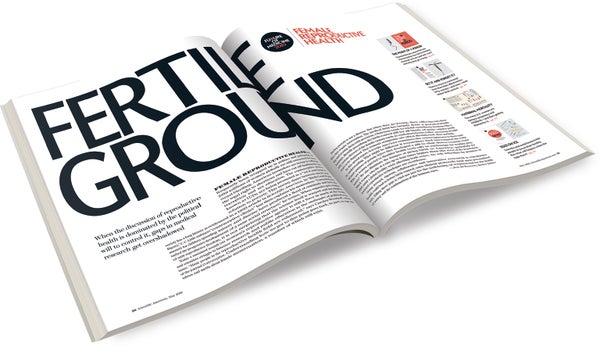This article was published in Scientific American’s former blog network and reflects the views of the author, not necessarily those of Scientific American
Have you heard about the “gender data gap”? I recently learned the phrase in an excerpt published in March in the Guardian from the book Invisible Women: Exposing Data Bias in a World Designed for Men, by Caroline Criado Perez (Abrams, 2019). “The gender data gap,” explains Criado Perez, “is both a cause and a consequence of the type of unthinking that conceives of humanity as almost exclusively male.”
With the world designed by men and for other men, being a woman actually can be a health hazard. Criado Perez writes about uncomfortable, or even dangerous, mismatches between men's bodies, which are larger and stronger on average, and women's in such areas as seat belts and car seating design, bulletproof vests for law-enforcement officers, mobile phones that can't be cupped with a smaller palm—even the size of cement bags, which are too large and heavy for the average women to heft but don't have to be that way.
You may be, like me, struck by similar—and equally unhealthful—gender data gaps as you read our annual special report on “The Future of Medicine.” This year we focus on “Fertile Ground,” women's reproductive well-being. Take menstruation. As Virginia Sole-Smith writes in “The Point of a Period,” old taboos and squeamishness have resulted in limited research on women's monthly cycles. Little is known about why periods can be painful and what is behind some related disorders. Although women historically had fewer periods over their lifetime because of multiple pregnancies, today they have many more periods on average. Is this harmful? Should women use birth control to skip their periods? We don't know. Says one source in the story: “‘What we have now’ with women using birth control for long-term [menstrual] suppression ‘is the largest uncontrolled medical experiment on women in history.’”
On supporting science journalism
If you're enjoying this article, consider supporting our award-winning journalism by subscribing. By purchasing a subscription you are helping to ensure the future of impactful stories about the discoveries and ideas shaping our world today.
Other stories in the report look at the science of making babies (“Eggs on Ice,” by Liza Mundy), birth control (“Set It and Forget It?,” by Maya Dusenbery) and the risks of childbirth (“How to Reduce Maternal Mortality,” by Monica R. McLemore). More than half the world will benefit from a better understanding of female reproductive health issues: giving women more agency over their reproductive lives is known as one of the most effective solutions to global challenges such as economic inequality. Read the article for an eye-opening look at what we know, and don't know, about the reproductive lives of half of humanity. A better future for us all may depend on it.
